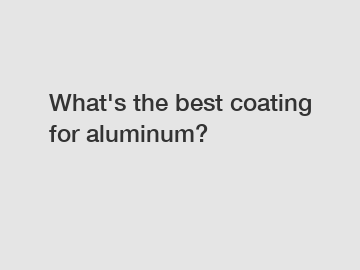What's the best coating for aluminum?
What's the best coating for aluminum? A question that has likely crossed the minds of many individuals engaged in various industries where aluminum plays a crucial role. Whether you work with aluminum in construction, automotive, aerospace, or even household items, finding the right coating is essential to enhance the metal's durability, appearance, and overall performance. With a plethora of options available, it can be quite challenging to determine which coating will best suit your specific needs. In this article, we will explore different types of coatings for aluminum and discuss their attributes, advantages, and limitations.
1. Anodizing: Anodizing is a highly popular coating choice for aluminum due to its ability to create a protective layer on the metal's surface. Through an electrochemical process, anodizing forms a durable oxide layer that provides excellent corrosion resistance. This coating also enhances the aluminum's scratch and wear resistance, making it suitable for various applications, including architectural, electrical, and automotive. Anodizing can be performed in various colors, offering aesthetic options as well.
2. Powder Coating: Another frequently used coating method for aluminum is powder coating. In this process, a dry powder composed of pigments, resin, and additives is electrostatically sprayed onto the metal surface. Then, the coated aluminum is cured in an oven, resulting in a durable and attractive finish. Powder coating offers numerous benefits like excellent resistance against impact, chemicals, and UV rays. Moreover, it provides a wide range of color choices and is considered an environmentally friendly option due to the absence of volatile organic compounds (VOCs).

3. Organic Coatings: Organic coatings, such as paints and lacquers, are often employed to protect and beautify aluminum. These coatings can provide exceptional aesthetics and are available in multiple colors and finishes. However, they generally offer lower durability compared to other coating methods, making them more suitable for indoor applications or environments with minimal exposure to harsh conditions. Organic coatings can be easily applied using methods like brushing, spraying, or dipping, which makes them convenient for various industries.
4. Cladding: Cladding involves applying a layer of a different metal, such as stainless steel, to the aluminum surface. This technique combines the strength and corrosion resistance of the cladding metal with aluminum's lightweight properties. Cladding is often used in architecture, where durability, aesthetics, and resistance to weathering elements play a significant role. However, it is important to note that cladding can be an expensive option and may not be suitable for all applications.
While the above-mentioned coatings are frequently utilized, it is essential to consider certain factors before making a final decision on which coating to choose for aluminum:
A. Environment: The environment in which the aluminum will be utilized plays a crucial role in coating selection. If the metal is exposed to harsh weather conditions, chemicals, or high temperatures, highly durable coatings like anodizing or powder coating may be more suitable. On the other hand, for indoor usage or low-exposure environments, organic coatings may suffice.
B. Aesthetics: Depending on the desired appearance of the aluminum, different coatings offer varying options. If a specific color or finish is desired, powder coating or organic coatings might be ideal due to their wide range of choices. Anodizing also offers several color options while preserving the metallic look.
C. Purpose: Understanding the specific purpose of the aluminum is essential. For applications where corrosion resistance is crucial, anodizing is often the go-to choice. If impact or abrasion resistance is a priority, powder coating is appealing. Cladding, on the other hand, provides a combination of strength and aesthetics, making it suitable for architectural applications.
In conclusion, determining the best coating for aluminum requires careful consideration of the intended purpose, environment, and desired appearance. While anodizing, powder coating, organic coatings, and cladding are popular options, each possesses its own set of advantages and limitations. It is vital to assess these factors and consult with professionals or coating manufacturers to ensure the chosen coating will effectively meet the specific requirements. With the right coating, aluminum can achieve enhanced durability, aesthetic appeal, and an extended lifespan, making it an optimal choice for various industries.
If you want to learn more, please visit our website aluminium roof coil, color coated coil manufacturer, aluminum coil tagging.
102
0
0


Comments
All Comments (0)